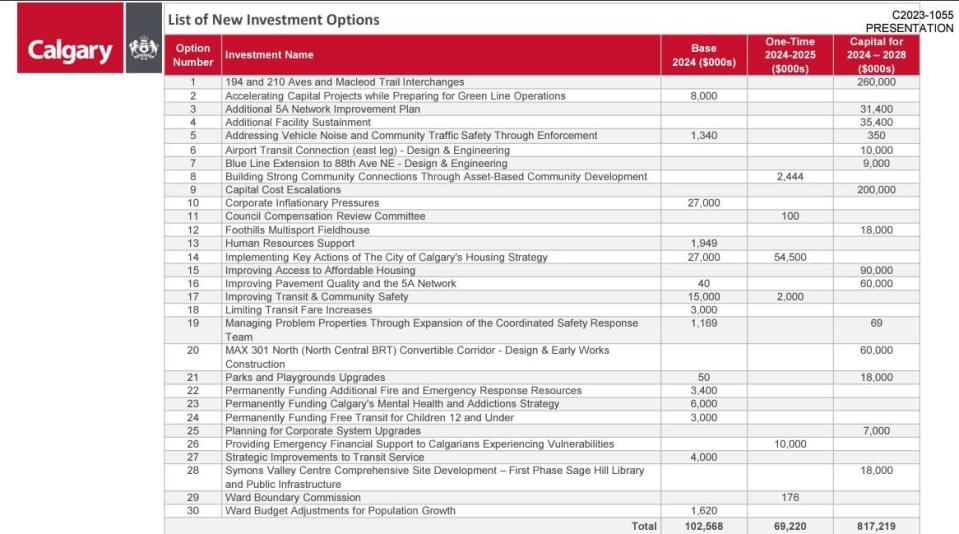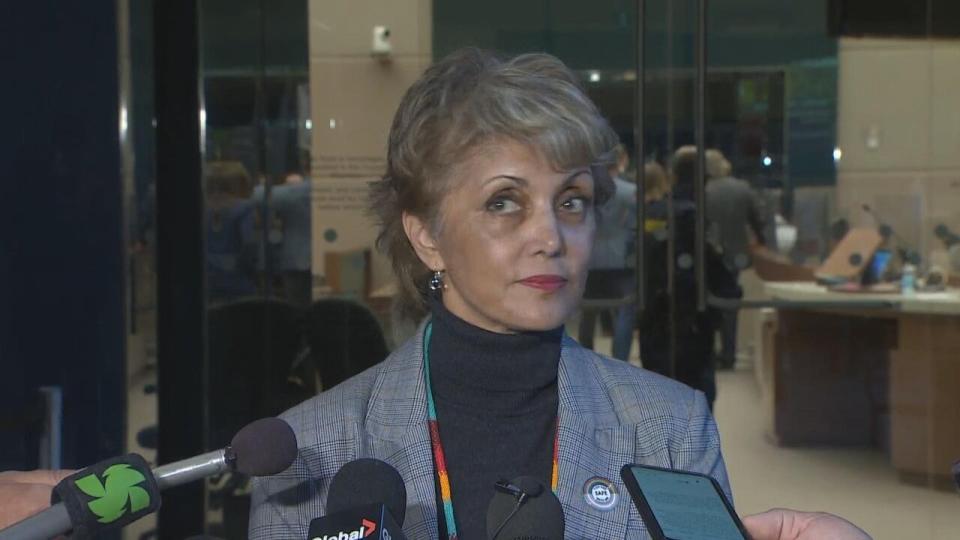Council puts out list of options for Calgarians to consider ahead of budget

In an attempt to give Calgarians more notice of potential changes to next year's municipal budget, city council has released a list of potential investments it believes people want.
The list of 30 projects is worth $989 million, but questions remain unanswered about how the city can afford the items on the list and what it could take out of the budget to pay for them.
The list includes items that would add ongoing expenses to the city's base budget, one time spending items, and capital projects which could be built over the 2024-28 timeframe.
The big ticket items include two new interchanges on Macleod Trail at 194th Avenue and at 210th Avenue S. There's also $200 million which would be used to deal with inflationary pressures that are hitting other capital projects.
The list also includes money for transit improvements, a new field house and cash for the updated housing strategy.

Calgary city council's list of 30 potential projects. (City of Calgary)
Discussions around Calgarians' needs
Mayor Jyoti Gondek said the list comes from months of discussions that council has been having with city administration about how to better meet the needs of Calgarians.
The idea of putting out the list now is to let citizens in on the potential investments and give them time to provide feedback.
"At the beginning of November, we'll have a much better picture of the revenue side of the equation before we go into deliberations," said the mayor.
In the budget debate later that month, she said council will have to make some choices.
"If we don't [have the money], how will we generate it? Will we be looking at other sources like user fees? Will we be dipping into reserves? Do we need to adjust the mill rate for property taxes?" she asked.
"Or do we simply not approve all of those investment items and only do what we can afford?"
Council approved a four-year budget plan in November 2022 that included a property tax hike of approximately 3.5 per cent for 2024.
The final figure will depend on budget adjustments that council will vote on in late November.
Some members of council aren't happy about the new budget process.
Coun. Sonya Sharp praised administration for looking at the budget in a different way, but says this process seems backward.
"We went shopping before even we even looked at what's in the bank account. So we're going to have to figure out how we're going to pay for all this," said Sharp.
She said the city has limited tools to come up with the extra money. It can use some reserve funds but there are limits on how much it can tap into those.
The other option is raising taxes or user fees, but Sharp said in an affordability crisis, there may be a limited appeal to doing that at this time.
Getting more money from other orders of government is another option, but she's not optimistic large provincial or federal cheques will be landing by the end of November.

Mayor Jyoti Gondek says the city council will have a 'much better picture of the revenue side of the equation' in early November. (Mike Symington/CBC)
Local politicians are meeting in Edmonton this week at Alberta Municipalities' annual convention.
One item on their agenda is potentially calling on the provincial government to boost municipal grants by $1 billion.
Coun. Andre Chabot said municipal leaders are struggling with the additional costs associated with Alberta's growing population.
He said cities and towns are having to deal with issues like the mental health and addictions crisis that aren't part of their core responsibilities.
"Because the province is not stepping in, somebody has to respond to it. And so there's downloaded responsibility that further exacerbates our challenge from our infrastructure deficit," said Chabot.
"It's not just a capital deficit. It's an operational deficit that we're also facing."


